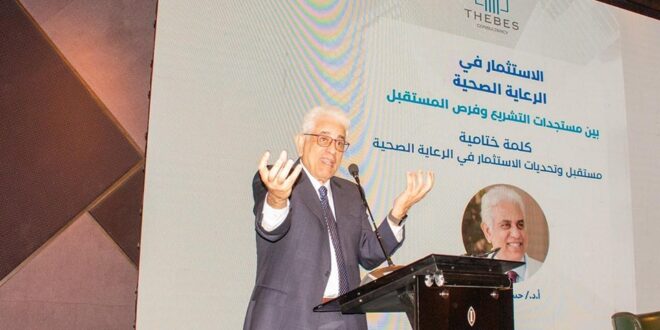At the invitation of Dr. Ziad Bahaa El-Din and under the theme “The Future of Investment in Healthcare,” Dr. Hossam Badrawi participated on Monday, June 16, 2025, in the activities of a workshop held at the Semiramis InterContinental Hotel in Cairo. The event was organized by Tayba Investment Company to discuss the legislative and regulatory framework for attracting both local and foreign investment in the medical sector.
The workshop was held in light of the recent issuance of several important laws, most notably the Law on Granting Concessions for the Establishment, Management, and Operation of Hospitals, the Medical Liability Law, and the Unified Insurance Law.
In his speech, Dr. Badrawi explained that the goal is to open new avenues for investment, but it is essential to recognize the contradictions within Egyptian society regarding healthcare investment to be able to create a clear vision for this file.
He pointed out that both the Constitution and current policies state that healthcare is a right for citizens, not a commodity for purchase. This right implies that society is obligated to cover the cost of this care and ensure it is of high quality, befitting the citizen. As a general principle, every service has a cost, and thus there must be sustainable funding for healthcare — this is where the role of health insurance becomes evident.
To avoid confusion, Dr. Badrawi emphasized that the role of health insurance is not to improve the quality of care but to provide funding for the beneficiaries.
He then shifted to discuss the role of investment and the private sector, stressing the importance of publicly announcing an investment roadmap to develop healthcare in the country. He noted that only 25% of healthcare service providers belong to the private sector, while the state owns the remaining 75%. However, this 25% serves more than 75% of the beneficiaries due to greater public trust in the private sector compared to the public one. Furthermore, over 60% of healthcare costs are borne by the service recipients themselves, which contradicts the notion that healthcare is a right and not a paid service. Despite this contradiction, Dr. Badrawi sees a promising opportunity.
He expressed concern that if health insurance were to bear the full cost of healthcare, this would pose a massive challenge, as the amount paid by beneficiaries may not match the actual costs. If the state decided to offer health insurance without a financial cap, it could lead to bankruptcy of the national budget.
Dr. Badrawi stressed the importance of identifying and resolving the obstacles that hinder investment in healthcare in Egypt and working to improve efficiency so investors can see a fair return on their investments and not seek opportunities elsewhere. He highlighted the need to achieve a balance between ensuring citizens’ right to healthcare and making healthcare investment successful. He also emphasized that all modern systems worldwide now rely on digitalization and efficient service management.
He further noted that 60% of healthcare needs fall under primary healthcare, which requires the state to collaborate with young doctors to grow a new private sector led by recent graduates to deliver these services. He affirmed that primary healthcare will serve as the filter through which patients move to higher levels of care. This will necessitate upgrading services and digitizing them so that patient data is accurate and visible across all levels of the healthcare system.
Dr. Badrawi concluded his remarks by expressing his pleasure and confidence that there are many opportunities in this sector. All the state needs to do is clarify the investment map in this field and actively encourage investors to participate.
The sessions of the workshop were moderated by Dr. Ziad Bahaa El-Din, principal partner at Tayba Consulting, and the event was attended by a number of government and private sector officials and experts.
 Dr. Hossam Badrawi Official Website
Dr. Hossam Badrawi Official Website


